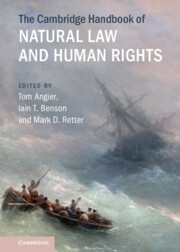Book contents
- The Cambridge Handbook of Natural Law and Human Rights
- The Cambridge Handbook of Natural Law and Human Rights
- Copyright page
- Contents
- Contributors
- Acknowledgements
- Introduction
- Part I Natural Law and the Origins of Human Rights
- Part II Natural Law Foundations of Human Rights Obligations
- Part III Natural Law and Human Rights within Religious Traditions
- 14 Natural Law, Natural Theology, and Human Rights in the Jewish Tradition
- 15 Natural Law and Human Rights in Catholic Christianity
- 16 Natural Law and Natural Rights in the Early Protestant Tradition
- 17 Human Rights or Moral Obligations?
- Part IV The Human Person, Political Community, and Rule of Law
- Part V Rival Interpretations and Interpretive Principles
- Part VI Challenges and Future Prospects
- Index
15 - Natural Law and Human Rights in Catholic Christianity
from Part III - Natural Law and Human Rights within Religious Traditions
Published online by Cambridge University Press: 03 November 2022
- The Cambridge Handbook of Natural Law and Human Rights
- The Cambridge Handbook of Natural Law and Human Rights
- Copyright page
- Contents
- Contributors
- Acknowledgements
- Introduction
- Part I Natural Law and the Origins of Human Rights
- Part II Natural Law Foundations of Human Rights Obligations
- Part III Natural Law and Human Rights within Religious Traditions
- 14 Natural Law, Natural Theology, and Human Rights in the Jewish Tradition
- 15 Natural Law and Human Rights in Catholic Christianity
- 16 Natural Law and Natural Rights in the Early Protestant Tradition
- 17 Human Rights or Moral Obligations?
- Part IV The Human Person, Political Community, and Rule of Law
- Part V Rival Interpretations and Interpretive Principles
- Part VI Challenges and Future Prospects
- Index
Summary
The Catholic Church holds the concept of natural law in reference to a created order. While this concept has been put aside in philosophy and science the Church deems that creation implies an inherent relationship between all its components. The Social doctrine of the Church is built on the concept of natural law accessible to human intelligence. The teaching of Thomas Aquinas drawing from Aristotle remains the main source of Catholic understanding of natural law. Natural law and natural rights are not to be confused. Right refers to a natural order of things, which is the natural law apprehended by reason at a given moment. The source of human rights is entailed in a measure inscribed in the order created by God. So natural rights are determined on the basis of what constitutes a just relationship between persons in accordance with natural law. The attention given today to the ecosystem including the biosphere and human society altogether brings us back to the core of natural law. The ecosystem witnesses to an order which pre-exists to our attempts to use it arbitrarily. ’Integral ecology’ apprehends the human being in its interdependence with the created order of the universe.
- Type
- Chapter
- Information
- The Cambridge Handbook of Natural Law and Human Rights , pp. 218 - 232Publisher: Cambridge University PressPrint publication year: 2022



